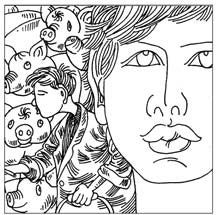|
As millions of newly graduated college students enter the labor market every year, jobs have become more difficult to obtain. Some graduates have raised the question: "Is there a solution?"
There are two ways to answer that question. First, the students keep changing their minds about their occupations. Second, the government - and the society - creates conditions to help students change their minds.
Today, as compared with one or two years ago, college graduates have drastically lowered their salary expectations - they now accept 1,000 yuan ($132) or even less a month. But they still shun jobs other than those with the government or a "regular" company in one of the country's major cities.
For most college graduates, landing a job in a rural township or a remote region or engaging in a plebeian business is a face-losing proposition. They would rather stay in a low-rent hostel, living on instant noodles, and sending out job application letters everyday.

For decades, college students have been regarded as "society's elites". Today, however, things have changed greatly. The ever-growing rate of college enrollment has led to a relatively popularized higher education and a huge army of graduates every year. This year, 4.95 million students graduated from universities and colleges across the country. Twenty years ago, the figure was 340,000. College graduates have become no different from other job seekers in the labor market. Frankly, they are ordinary laborers.
They should realize that they are far from popular with employers as they think themselves to be. Surveys indicate that companies that have employed college graduates have found them to shun laborious work, and the knowledge they acquired at university was of no practical use. Many companies have openly stated that they would not recruit new graduates.
Shedding their sense of "elitism" and taking a job at grassroots level is a practical alternative.
In fact, working in a low-ranking, demanding occupation can toughen one's will and help one accumulate experience, and develop competitiveness. In this sense, any job can be a good start to one's career.
Last week, there was a report about a university graduate surnamed Zhong from Chengdu who earned 400,000 yuan ($52,632) this year raising pigs in a remote mountainous village after he quit his white-collar job at a stockbrokerage four years ago.
Raising swine is generally thought to be a low-status occupation. However, Zhong used his knowledge to develop a pig farm with advanced technologies and succeeded in grasping market opportunities. His success could be an example for other college graduates.
Of course, many difficulties college graduates will encounter in rural and remote regions are beyond their abilities to solve. For instance, unfair competition they may face because of corruption and nepotism among local officials; distortion of State policies by some local government departments; poor execution of the law in backward regions, and so on.
In this regard, local governments, especially the powerful provincial governments, should seriously move to settle these problems so as to create a friendly environment for college graduates to contribute to the construction of our rural and undeveloped regions.
E-mail: liushinan@chinadaily.com.cn
(China Daily 10/31/2007 page10)
我要看更多專欄文章
|